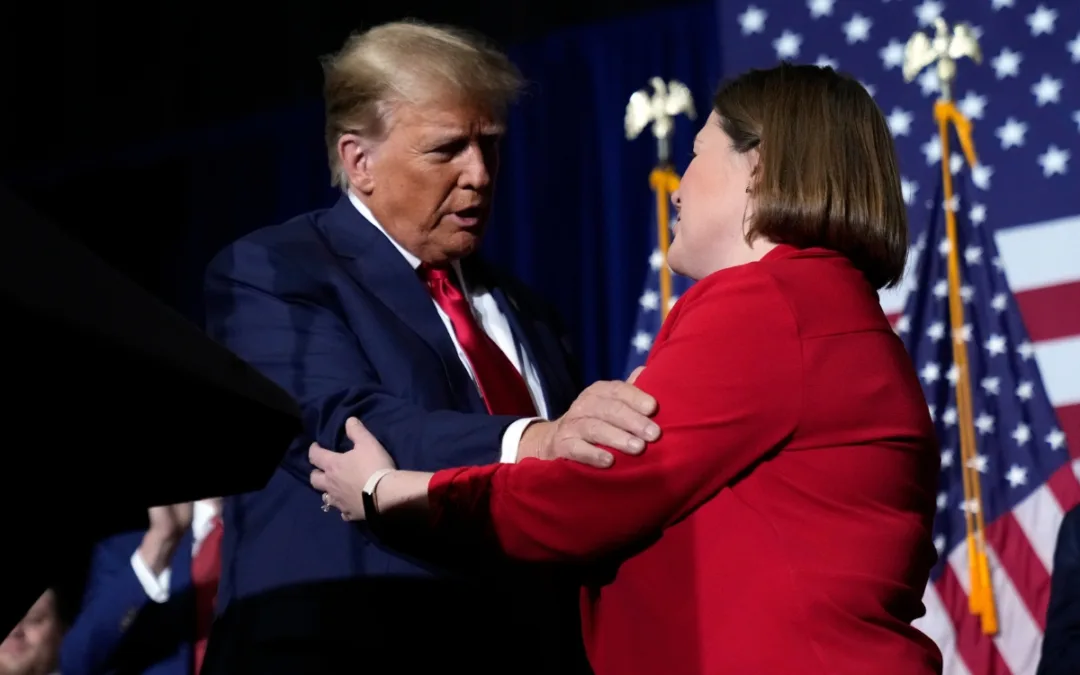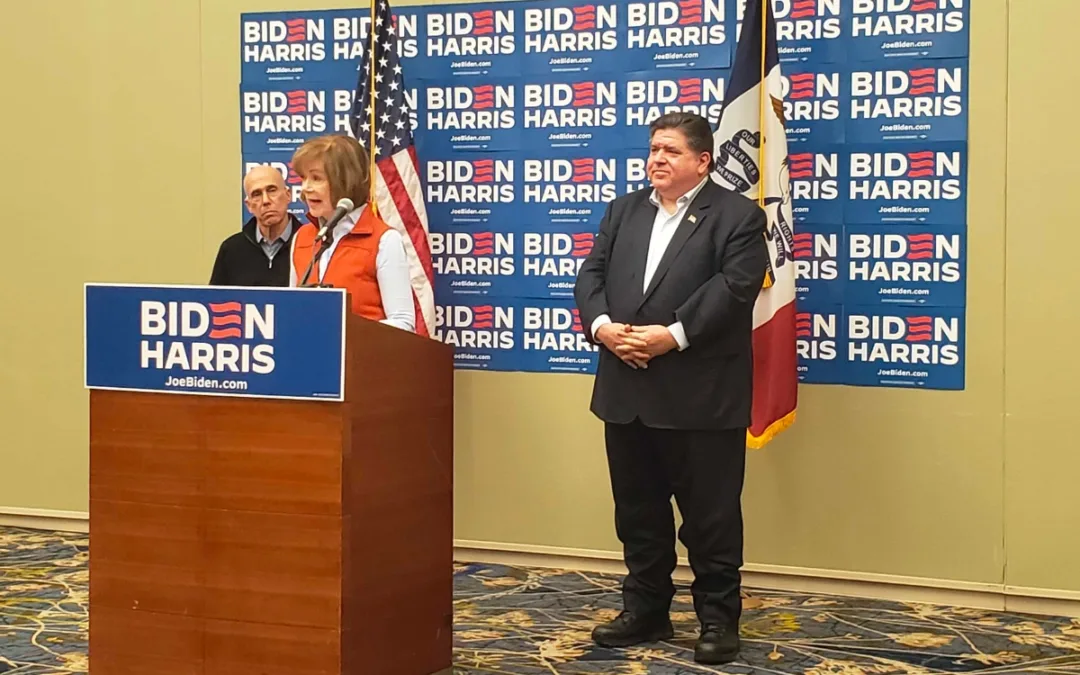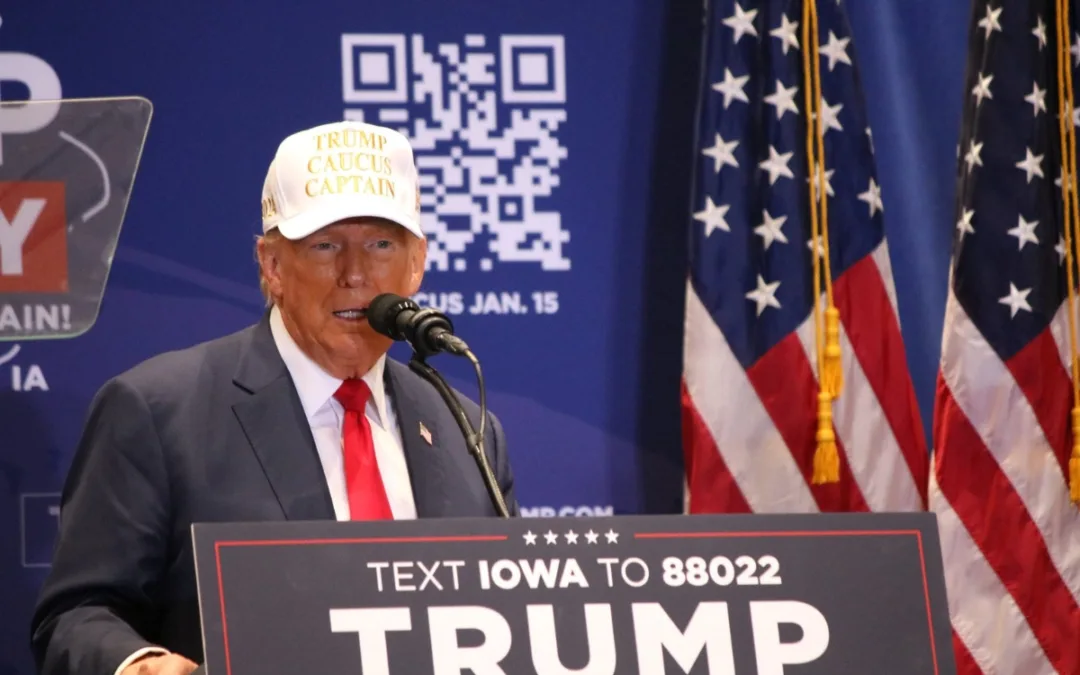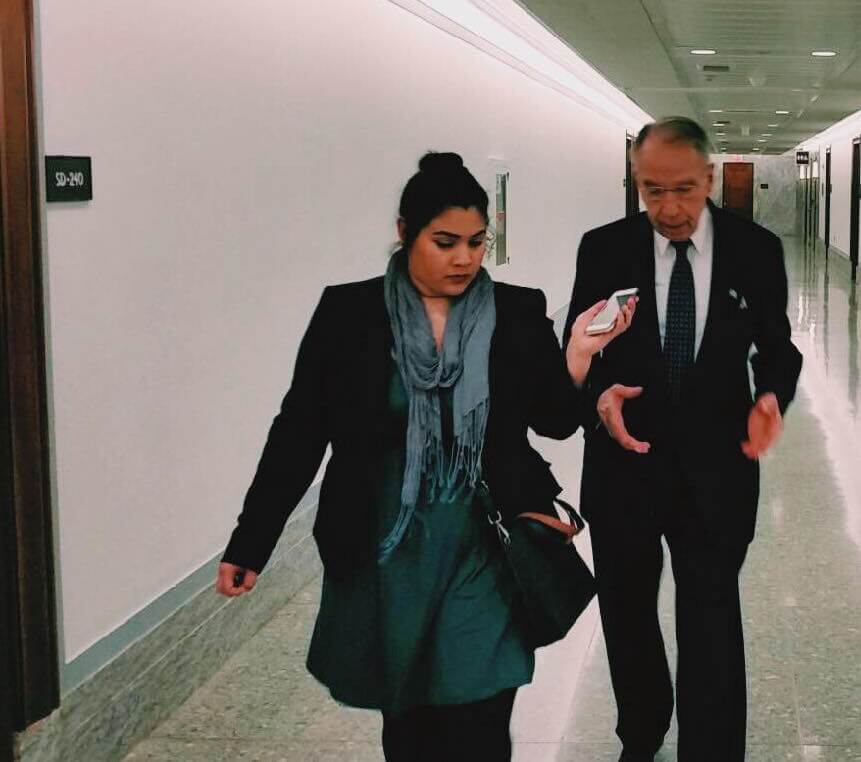
Coming soon to a byline near you…
Student journalists got a front row seat to national politics during this past year’s Iowa Caucus. The access and opportunities they had to interview presidential candidates and break news on the most fascinating campaign in decades was unmatched around the country, and many Iowa college students took full advantage.
A number of student reporters at Iowa universities stood out in their coverage of both the Iowa Caucus and Iowa politics as a whole. And just like in the political operative world, there’s nothing better than having Iowa on your resume. So Starting Line thought it useful for you to get to know some of Iowa’s rising young journalists as you’ll probably be seeing their names soon enough at some key news outlets.
We asked the students what their experiences were like covering Iowa politics, what their favorite story they’ve written is, and how they see the role of journalism evolving in the digital age. Here’s what they said:
Name: Alex Hanson
College: Iowa State University
Year: Sophmore
Hometown: Bettendorf, Iowa

What publications have you written for and what topics have you focused on?
Almost all of my writing has been for the Iowa State Daily on politics. It’s been a combination of politics on campus, state legislature, Iowa races for Congress, what Iowa’s members of Congress are working on in D.C. and caucus stuff, of course. As a news editor, I’ve also helped out with breaking news related to ISU (emergency stuff, some university administration stuff). I also keep an eye on the Board of Regents because it plays into Iowa politics so much.
I also did contribute to a political magazine on campus. It was an 1,800 word story about outsider candidates in the 2016 race. A little different from newspaper writing, but had a fun time being able to be more flexible. The magazine was called “Veritas.”
What drives your interest in reporting?
I consider myself a news junkie, so the fact that I’m eager to know about news before everyone else is probably what made me decide to go into journalism school. Combine that with the fact that I think it is important to report and tell stories in a fair way so that everyone is informed of the facts, and you have what drives me.
How was your experience like covering the Iowa Caucus while it was in town?
It was unlike anything I’ve every experienced and very nerve-racking, even after I went to dozens of events. Every event was different and you did not know what to expect, but I think the fact that I was able to do reporting with professionals as a college student made it even more amazing. It was quite a unique opportunity for college students in Iowa — reporters, including college media, do not have this type of access to presidential candidates in other states, so I’m glad that I was able to be a part of it.
What’s your favorite story you’ve written and why?
It was always fun being part of events that were very news worthy — the Palin endorsing Trump one at ISU sticks out, but interviewing candidates one-on-one was probably may favorite experience.
Rand Paul: We’re In For A Long Campaign
Martin O’Malley Seeks Contrast With Other Democrats
Bobby Jindal: Iowa Strategy Will Pay Off
I also throughly enjoyed covering the candidates at the Cy-Hawk game, probably because it was just a very hectic day: GOP Candidates Use Cy-Hawk Game To Meet Voters
Last one is more recently when Congressman Steve King just randomly called me on a Saturday and it led to that “very nasty” race comment, ended up being in POLITICO, made some news. Very unique to have him call me (he was supposed to call on Thursday for a set interview, but missed it…but called on Saturday and said he saw me tweeting, so he’d try again): Steve King: 4th District Primary Will Be Very Nasty
Where do you see online/digital journalism going and how do you hope to fit into that?
Cleary digital and online stuff is becoming more and more important, and we’ve really tried to come at our reporting with a digital first mindset at the Daily. We try to keep a balance of getting things up quickly but still staying accurate. I mentioned above I consider myself a big news junkie, so the digital aspect of journalism really appeals to me — I’m informed of details up to the second. I also like using Twitter, Snapchat, Instagram to do quick reporting. But, I continue to be a newspaper person, so I always put a big emphasis on how the stories are told on paper.
Name: Rebecca Morin
College: University of Iowa
Year: Senior
Hometown: Donna, Texas

What publications have you written for and what topics have you focused on?
I’ve mostly spent my college career writing for The Daily Iowan. I began by covering the crime beat, and then covered the Iowa City City Council. During my time covering city council, I wrote primarily about a flood mitigation projected entitled the Gateway Project. In addition, I wrote about issues that face minorities on campus. One summer, I even went home to write about the influx of undocumented immigrants coming over the U.S.-Mexico border. The majority of them were coming in an area 20 minutes away from my hometown. I was able to provide a different perspective on the situation and explain what I saw to Iowans who live more than 1,000 miles away from the area. I then moved on to covering the Iowa legislature and Iowa’s congressional delegation, following a year-long stint as metro editor. I focused mostly on Iowa’s budget while covering the legislature, as well as foreign policy and how Iowa’s congressional leaders felt about hot topics such as the Iran deal, when it was at the forefront in political conversations. I have since focused on the Iowa caucuses and presidential politics.
What drives your interest in reporting?
As simple and cliché as it sounds, I just like telling people’s stories and just hope at least one of my stories impacts one person’s life. If I open someone’s mind to a different point of view or different idea, I think I did my job right.
How was your experience like covering the Iowa Caucus while it was in town?
The simple answer: exhilarating. Iowa is such an interesting place because of how politically active everyone is; students in high school, college students, parents, grandparents. Politics is definitely a family event here. Hearing people’s different opinions and seeing why they were attending an event is not only enlightening, but crucial when finding different story ideas and identifying trends.
What’s your favorite story you’ve written and why?
As of recently, I think my favorite story has been one that’s spurred from when The Daily Iowan Ethics and Politics Initiative team went to D.C. We were able to follow Sen. Chuck Grassley around for a day. We got to see what his day was like, and that was also the week the SCOTUS nominee was announced. I wrote a story about why Iowan Republicans feel like Grassley is making the right decision in not holding SCOTUS hearings.
Iowa Republicans Firm On Supporting Grassley
Where do you see online/digital journalism going and how do you hope to fit into that?
We are in the digital age. Despite working at a newspaper, the bulk of my reading is done online. I’m lucky, though. Our politics team has its own website. From posting stories online, adding links, video, and photos, to sharing the stories through our social media, I’ve had a taste of what online journalism is like. It’s fast and versatile. There is no doubt in my mind that I will continue to find better, more appealing ways to include video content, and Tweets or Facebook posts embedded into my stories.
Name: Brent Griffiths
College: University of Iowa
Year: Senior
Hometown: Omaha, Nebraska

What publications have you written for and what topics have you focused on?
I’ve written primarily for The Daily Iowan, but also did a short stint as a summer intern at the Gazette. Starting out I covered Johnson County courts for the DI, but in my spring semester began covering Iowa politics with a focus on the legislature. During my internship I was a general assignment reporter, so I covered a whole range of topics across Eastern Iowa. Since then I have almost exclusively covered politics along with renewable energy policy.
What drives your interest in reporting?
My journalism adviser in high school liked to say that a reporter was a naturally curious person. I love nothing more than diving into a topic and absorbing as much knowledge as I can, which is a typical day for a political reporter — especially when it comes to policy stories. Also at the end of the day, someone is going to be the next president and what he or she uttered during some summer town hall in Iowa could have a profound impact on our nation and even beyond. There’s a reason why national and international journalists come here and it’s for far more than just the butter cow.
How was your experience like covering the Iowa Caucus while it was in town?
Growing up in Omaha, I always wondered just why these people just across the border have this immense political power—the question I’m sure you and every Iowan has been asked ad nauseam. More than any interview or candidate I talked to, my biggest take away will be from Iowans themselves. So much focus is put on the horse race, pundits and polls that can make it easy to forget about the people who actually determine the outcome. But easily the best part was on caucus night itself. There was just something powerful about standing in the middle of a room and watching it all unfold.
What’s your favorite story you’ve written and why?
Frankly even before caucus night, a lot of people wrote off Iowa as a Bernie state because of the demographics. But I like this story, because there is something uniquely human about whether to hope for a moonshot once again or accept the limitations of reality. Having the ability of hindsight and watching this race unfold, I think this divide really gets at the core of the Democratic race. Given Clinton’s lead right now there is a lot of discussion on what Sanders’s supporters will do this fall. But I’m more interested in what happens after Election Day and where this type of purity politics fits into the party. You just heard what Vice President Biden has to say about this today and I would venture to guess he is far from the last person to weigh in.
Change To Believe In Or Change That Can Be Achieved
Where do you see online/digital journalism going and how do you hope to fit into that?
In journalism school we are often told this cliché about how newspapers may die, but storytelling and news will always live on. Clearly people are going to want to know what is going on, but the way we are telling news now is not interesting to a lot of people. It does not escape me that many of non-journalist friends like to get their news from John Oliver, or when it was still on, The Colbert Report. Candidates and politicians clearly do not need us as much anymore — just look at how the White House’s massive communications operation. So while I can’t tell you what medium we will use to tell stories, I do see this business having to grapple with this challenge of meeting people where there are instead of the other way around. I hope to fit into it by exploring how to use my passion for politics in telling stories in more non-traditional ways.
Name: Lissandra Villa
College: Iowa State University
Year: Senior
Hometown: Grew up in Webster City, Iowa, originally from Mexico

What publications have you written for and what topics have you focused on?
I am currently an intern for The Des Moines Register. I founded and served as editor-in-chief of Veritas, a campus magazine that focuses on political coverage. I have written for The Cedar Rapids Gazette and The Iowa State Daily as well. After graduation I will be starting an internship at TIME magazine’s Washington, D.C. bureau.
What drives your interest in reporting?
My interest in reporting stems from my interest in public service and giving people the information they need to be engaged citizens.
How was your experience like covering the Iowa Caucus while it was in town?
My experience on the campaign trail was busy. I was driving all over the state chasing down candidates and getting one-on-one interviews. It was also a good opportunity to work on telling the story on different platforms.
What’s your favorite story you’ve written and why?
One of my favorite stories I’ve written was about a proposed mixed-use facility that would replace the library in Marion, Iowa. It required tracking down a lot of sources and statistics, and it was a challenging topic to write about because the project was at a very conceptual and controversial stage.
Marion Library Board Wants To Move Ahead On Mixed-Use Project
Where do you see online/digital journalism going and how do you hope to fit into that?
I think there’s a lot of potential for journalists to use online/digital journalism to better engage with their audience. I hope my generation of journalists plays a role in maintaining a high journalistic integrity.
Name: Jake Bullington
College: Drake University
Year: Sophmore
Hometown: Hastings, Minnesota

What publications have you written for and what topics have you focused on?
I’ve written once for Drake Mag and almost weekly for The Times-Delphic. I’ve mostly focused on student government, public safety and localizing national politics.
What drives your interest in reporting?
My interest in reporting is primarily driven by my desire to make my classmates more aware of what’s happening around them and why things are the way they are. The thrill I get from people coming up to me and saying that, before reading the article they had no idea something happened, wants me to continue reporting. Giving people on campus a voice that may not normally have one is also an amazing feeling.
How was your experience like covering the Iowa Caucus while it was in town?
When the Iowa Caucus came to town, I interned with Fusion and CBS and learned so much about what goes into a nationally televised production. The logistics and amount of staff it takes goes far beyond the reporter and camera guy. Almost everyone I met had seemingly endless amounts of career advice for me.These people, with years of traditional news backgrounds, were interested in how college students today, like me, were covering national politics too. Their interest in our small campus newspaper surprised me.
What’s your favorite story you’ve written and why?
It may not be the most exciting or high-traffic story I’ve written, but it’s the one I’m most proud of: I broke down the annual report on campus crime. It’s a lot of statistics and explaining compliance to federal laws to people in a way that they’ll actually want to read. It was the first time I’d ever written anything about crime in a statistical way and for readers, numbers are boring. So, making it interesting was the biggest challenge and the most rewarding part.
Where do you see online/digital journalism going and how do you hope to fit into that?
I’ll answer this part by saying that after graduation, I hope to have a job that doesn’t exist right now. You’ll hear this everywhere, that things are changing at such a rapid pace. But, right now I’m pushing the TD’s Twitter and Snapchat, because I see those platforms as the main places college students consume updates about what’s happening on campus. I don’t think Twitter will be around for much longer.
I hope to maintain my youth and adapt to newer technology and platforms more efficiently than some of the mainstream outlets have. It’s more than just having a Snapchat account or Facebook live videos, it’s doing it effectively.
Name: Nicholas Fisher
College: University of Northern Iowa
Year: Junior
Hometown: Mechanicsville, Iowa

What publications have you written for and what topics have you focused on?
Currently I’m the executive editor for the University of Northern Iowa school newspaper, The Northern Iowan, but I’ve written for other publications as well — the Mount-Vernon Lisbon Sun, Iowa Watch and I will be an intern at the Waterloo-Cedar Falls Courier this summer.
At the NI, I’ve been reporting on race and issues of diversity on campus quite often. Those stories found me more than the other way around. For the Sun, I wrote features on the good people of Mount Vernon and Lisbon. I enjoyed that very much. I provided caucus season coverage of the presidential candidates for the Iowa Watch, but more recently contributed to their project on the limits of speech on Iowa college campuses. That will be published in May.
I also publish articles in a student fashion and music magazine called Uprising here at UNI. I suppose I’m all over the place.
What drives your interest in reporting?
I certainly enjoy speaking with passionate people about what they are passionate about — whether that is activism, community projects or art or anything else. Reporting is often assisting — presenting someone’s story or passion in the most impactful way possible. Behind every story is at least one passionate person, and sometimes that’s the reporter too.
How was your experience like covering the Iowa Caucus while it was in town?
The short answer is “chaotic.” This is my first time participating actively in the caucus season, and for that first time to be as a reporter on an oft-visited college campus was fascinating and overwhelming at the same time. And to take those elements (first-time participant, first-time reporter) and apply it to this specific caucus season — it’s something I’ll never forget. The passion of people, wherever they were on the political spectrum, was a wonder to behold.
What’s your favorite story you’ve written and why?
It’s tough to choose, having covered such a wide range of topics, but I think I’d have to pick the one I think has been the most impactful. The headline was “Racial hostility plagues CV” (the Cedar Valley). As a white reporter on a largely white campus, I was stunned to find how deep, severe and complex racial tensions run on the campus (I later found out other white students were just as ignorant as I was).
The opening quote was from a black student who said she didn’t expect people at UNI to not like black people — I thought that was so powerful. It’s important to step out of the way with a story like that and that’s what I did. We published a series of pictures of students next to their description of a racially charged incident they had faced as a student of color. I think we did that for 8 issues in a row on the front page. It seemed the least we could do.
The original story was published in October 2015 and following rather extensive coverage of the issue (as well as vocal activism), administrators at UNI responded to the concerns with open forums discussing diversity. Sure enough, the then-VP of UNI referenced the story I wrote when talking to a student. He said he’d read about her experience in the newspaper. I let myself feel proud about that, and it’s that feeling that motivates the reporter to keep doing what they’re doing.
Where do you see online/digital journalism going and how do you hope to fit into that?
I often find myself partial to print journalism, I think that is very important. But I don’t think it makes sense to think of print journalism and online/digital journalism as binaries. We should value both. We have an up-and-coming digital journalism program here at UNI, and a big player in that is Chris Martin, the director for The Northern Iowan. The two should be intimate and not opposite.
But I will say online journalism, in its many forms, is becoming the go-to for information; everyone knows that. At the NI, we’ve invested in our online platform and our online presence is becoming a number-one priority for the next academic year.
Name: Madeline Meyer
College: Drake University
Year: Senior
Hometown: Pella, Iowa

What publications have you written for and what topics have you focused on?
I have worked with the Des Moines Register for their Iowa Caucus coverage that was entitled “Our Caucus” and featured on Medium. I also have written for the Times Delphic, and since I am a broadcast news major I have worked with Drake Digital News and was the editor of my high school newspaper The Pelladium. The topics I focused on recently have dealt with the Iowa Caucus and my experiences throughout the political hey-day during the Caucus while including some memories from my experiences in Washington, D.C.
What drives your interest in reporting?
My interest in reporting stems from my interest in people and their stories. I want to be able to understand different perspectives and relay those to the rest of the world in an intriguing way. Journalism is one facet where curiosity is key, and you get to learn knew things and broaden perspectives on a daily basis. I hope to pursue an avenue where I can use my curiosity and love for learning on a regular basis.
How was your experience like covering the Iowa Caucus while it was in town?
After spending two previous summers watching politicians in action in D.C., watching the Iowa Caucus in action was even more fascinating, because Iowans really care about retail politics. My favorite memory during the Caucus was covering the Iowa State Fair with Iowa Public Television because I was able to see how the different politicians interacted with Iowans. From helicopters, to press conferences, to a simple soap box speech, I really loved getting to see democracy in action.
What’s your favorite story you’ve written and why?
My favorite story that I have written is more of an opinion piece, and it is describing my different interactions with Sen. Ted Cruz leading up to the Iowa Caucus. It was featured in the Des Moines Register online and I received a lot of feedback from the piece. I liked that it was written from first person, and that I was able to create a profile for others of Sen. Cruz through my own eyes, in a way that wasn’t necessarily telling people how to think, but providing more of an analysis of these interactions.
Where do you see online/digital journalism going and how do you hope to fit into that?
The sad thing about online/digital journalism is that there is less fact checking and more information being produced at a rapid rate, so a lot of citizens have a problem trusting the media. One of the best ways for journalists to compete with digital media is to be multi-faceted. Now, people expect video reporting, they want brevity, and simultaneously want all of that content to be incredibly interesting. People don’t have the patience or time to sit down and read long format news stories. I think digital media is going to continue to become a race for who can get quality content in a brief message to the public. I also think that commenting and providing opinions on the news will be essential to engaging audiences long term.
Name: Clinton Olsasky
College: University of Northern Iowa
Year: Sophmore
Hometown: Des Moines, Iowa

What publications have you written for and what topics have you focused on?
I have written for The Northern Iowan, which is the student-run newspaper at UNI. In addition to writing for the paper, I also work as that paper’s news editor. Therefore, a lot of what I write about tends to be focused on local news here on campus and also on national news events at times. I have also had a few of my stories appear on the website IowaWatch.org. For that online publication, my stories have included coverage of the Iowa Caucus and the issue of free speech on college campuses.
What drives your interest in reporting?
My interest in reporting is largely driven by my passion for writing. I have always loved to write for as long as I can remember, and it only made sense for me to pursue a career in which I can make a living off of my writing. Also, I enjoy engaging and meeting with new people and learning about topics/issues through my reporting that I might not otherwise know about.
How was your experience like covering the Iowa Caucus while it was in town?
For the Iowa Caucus, I covered just one of UNI’s two democratic districts. This was not only my first time covering a caucus, but my first time being at a caucus in general. As a result, it was a great learning experience for me, and I learned a lot about being both a journalist and a U.S. citizen. There was a lot more people in attendance at my district than I had anticipated, which was a pleasant surprise for me, as it gave me an opportunity to talk to a lot of my peers about their thoughts on the election process.
What’s your favorite story you’ve written and why?
One of my favorite things that I’ve written was a story I wrote about a Donald Trump supporter that I talked to while covering a Trump rally at UNI’s campus. This individual was parked outside the event in a large semi-truck with Trump’s likeness plastered on the side. I really enjoyed writing this story because it came about completely by chance. I had originally talked to the supporter just to get a quote for my coverage of the rally. However, the supporter’s story was so interesting and unusual that I ended up writing a separate article about him. Here’s a link to the story as it appears on the Iowa Watch website:
Meet The New York State Artist Following Donald Trump With A Big Painting On His Truck
Where do you see online/digital journalism going and how do you hope to fit into that?
When it comes to the future of journalism, I definitely see online and digital platforms continuing to transform how we consume news. I think that these digital/online platforms will continue to serve as the primary modes through which we access news. At the same time, I think that, although print journalism is admittedly on the decline, it will still continue to survive, if only as a secondary/supplementary form of news to its digital counterparts. Personally, I hope to fit into this recent shift towards digital journalism by acquiring a strong set of digital (and journalism) skills.
by Pat Rynard
Posted 4/22/16
Politics
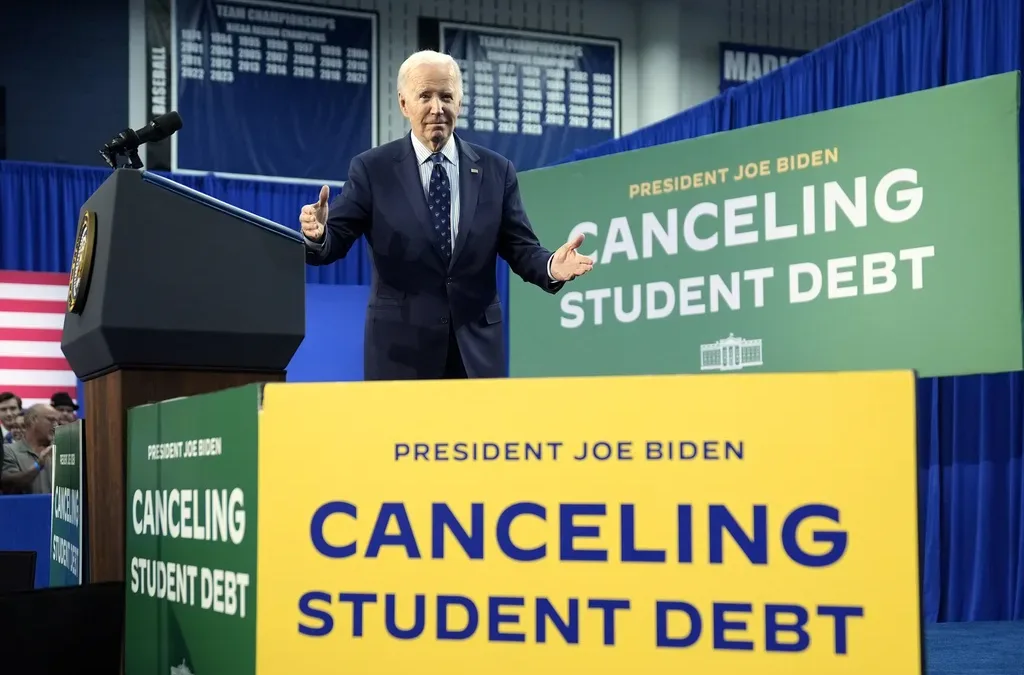
Biden cancels student loan debt for 2,690 more Iowans
The Biden administration on Friday announced its cancellation of an additional $7.4 billion in student debt for 277,000 borrowers, including 2,690...
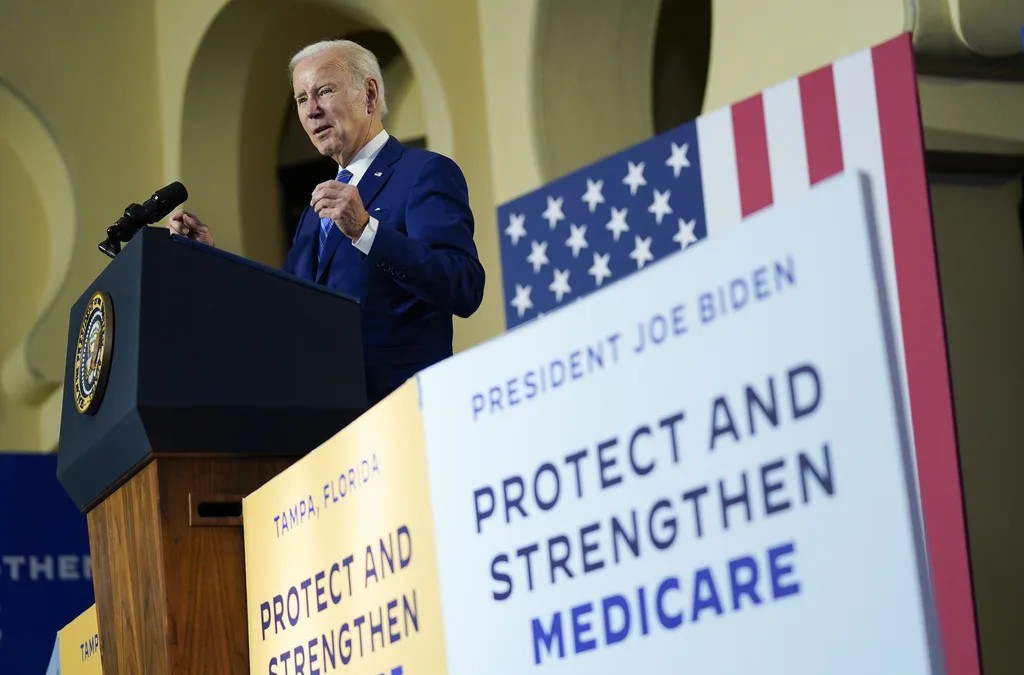
The Republican war on Medicare raises the stakes in 2024
Nearly 670,000 Iowans rely on Medicare benefits—benefits they spent decades paying into, with the promise that the program would be there for them...
Local News

No more Kum & Go? New owner Maverik of Utah retiring famous brand
Will Kum & Go have come and gone by next year? One new report claims that's the plan by the store's new owners. The Iowa-based convenience store...

Here’s a recap of the biggest headlines Iowa celebs made In 2023
For these famous Iowans, 2023 was a year of controversy, career highlights, and full-circle moments. Here’s how 2023 went for the following Iowans:...



